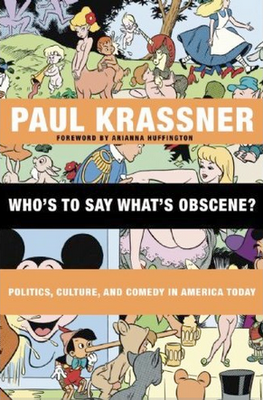Who's to Say What's Obscene?: Politics, Culture, and Comedy in America Today

I've long been a fan of Paul Krassner's more illustrious friends like Lenny Bruce and Abbie Hoffman, but until now I'd never gotten around to reading Krassner's own work. Who's to Say What's Obscene? appears to be a collection of random essays. I say "appears to be" because for most of the book, I had no idea what was going on.
The stories were interesting, but would just go from one to the next with seemingly no connection. I'd be reading about Don Imus, Michael Richards, and media censorship, and then the next thing I knew, I'd be reading about Walt Disney's death. Breaking the book down into chapters, as Krassner does here, is useless when each chapter is a random collection of essays that aren't even identified as separate pieces, and it left me scrambling. When I complained to my boyfriend, he replied, "That's what happens when you do a lot of drugs," which makes sense, as a lot of the book involves various scenarios where Krassner is about to go on a big interview, but then decides to do mushrooms beforehand to "enhance the experience."
By the middle of the book, I decided to just take each individual piece as it was and stop trying to make sense of everything. Eventually, I found the writing enjoyable. Krassner has lived a very rich life and raises good questions about what is actually obscene in our culture, based on his own opinions and experiences. As is to be expected, Krassner has a very liberal attitude towards most of the issues he raises in his book, like censorship in all its forms (he's against it) and legalizing drugs (he's for it). I do like reading viewpoints I agree with, but at times even I felt that Krassner took his opinions to the extreme.
Who's to Say What's Obscene? is a good book for people with short attention spans and far left-leaning views. Me personally, I'll keep it—but it'll lead a life doomed to the bathroom for short, mentally uninvolved reads, one to two times a day.